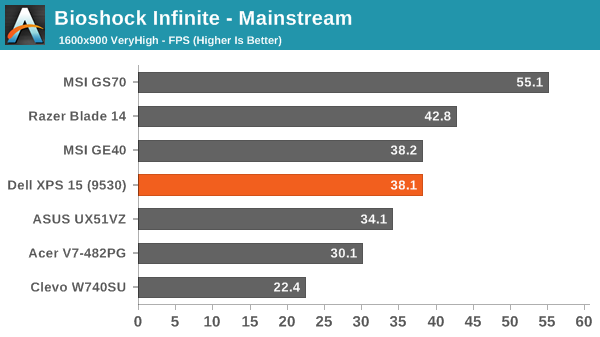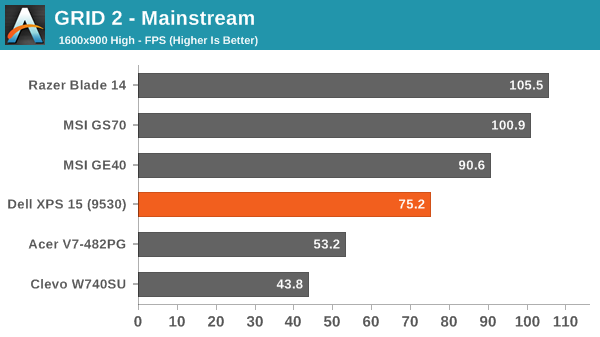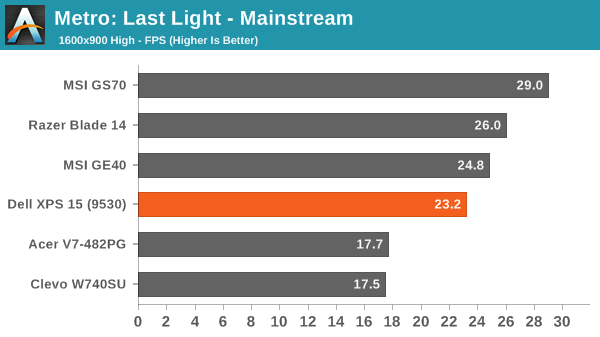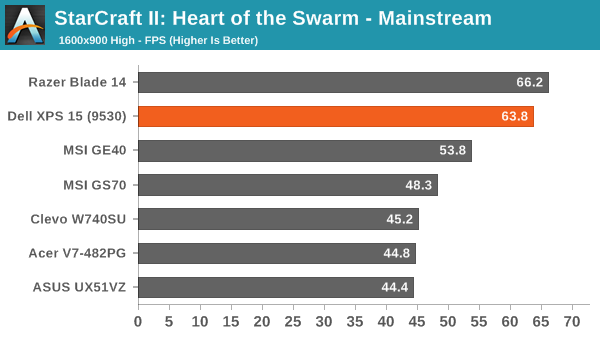Dell XPS 15 Haswell Edition: QHD+ with a Refined Design
by Jarred Walton on March 6, 2014 7:00 AM ESTDell XPS 15: Gaming Performance
With that lengthy preface about throttling, let’s just make it clear that all of the benchmark results here are from post-reboot testing, so throttling should not be present. What we find is that the GT 750M is a reasonable mainstream mobile GPU that can easily handle our “Value” settings and outside of the most demanding titles (e.g. Metro: Last Light) it can run our “Mainstream” settings as well. Not surprisingly, “Enthusiast” quality is mostly out of the question, except with older and/or less demanding titles. As for gaming at the native 3200x1800 resolution, that’s generally more than you can hope to get out of the GT 750M. Some games will certainly break 30 FPS at low to moderate settings, but in most cases opting for a lower resolution with higher quality settings will provide the better experience.
I also want to make note here that with 2014, we’re going to be reducing the number of games we test in our laptop reviews. There’s a real concern that running too many GPU-centric tests can distract from the overall target market for a device. While I’ve gone ahead and included most of the games from our 2013 test suite in Mobile Bench, moving forward we have decided to focus on just four games. Our current list consists of Bioshock Infinite, GRID 2, Metro: Last Light, and StarCraft II: Heart of the Swarm. These should provide a sufficient amount of data that we’ll be able to say how well a system handles gaming workloads. In some reviews we will also include other titles (e.g. if there’s a new GPU that warrants additional investigative work), including some less demanding games that will better illustrate the “casual gaming” aspect.




Considering this isn’t really being targeted at a gaming audience – Dell has their Alienware brand if that’s what you’re after – the XPS 15 still manages to hold its own in the gaming tests. Throttling concerns aside, when the fans and GPU are running as expected, gaming at one fourth the native resolution and high detail settings is easily accomplished, and even 1080p medium/high detail is possible.










152 Comments
View All Comments
Andrew Lin - Thursday, March 6, 2014 - link
can i ask how people fixed letterboxing in games? in certain directx11 games (bioshock infinite and anno 2070) i'm still being letterboxed when running at non-native resolutionJarredWalton - Friday, March 7, 2014 - link
I updated the Intel and NVIDIA drivers and I believe the Intel drivers then have an option to modify the scaling (it may have been present in the release drivers but it didn't work for me).Homeles - Friday, March 7, 2014 - link
We've had nothing but trouble with these and other XPS models at work. We must have gotten a bad batch -- a lot of dead HDDs out of the box.Conceptually, these are great computers. I love the screens on these. They're not bad to work on (read: repair), although changing one of the SO-DIMM sockets is rather annoying since you have to tear the whole thing down to get to it. I do dislike the slot load drive.
If it weren't for the myriad of hardware problems I've seen with these, they'd be a great product. Hope the Haswell version doesn't suffer the issues I've seen.
JarredWalton - Friday, March 7, 2014 - link
The new version is much easier to work with IMO -- no slot load drive, about eight hex screws to get to the internals, and if you get the SSD model, no HDD to speak of. But for a business, I suspect you'd want no GPU as it wouldn't be much use, and that's sadly not an option.jameskatt - Friday, March 7, 2014 - link
The Dell XPS 15 Haswell Edition is Dell's attempt to copy the MacBoo Pro 15-inch with Retina Display. Interestingly, it costs almost as much. But it fails in two major areas: 1) It doesn't have a PCIe SSD. Thus, its SSD storage is half as fast as Apple's. 2) It doesn't have Thunderbolt connectors. This means you cannot attach external PCI card cases nor get high speed storage as on the much more expandable MacBook Pros.Sad. But it is far better to run Windows on a MacBook Pro than to run Windows on a Dell attempt at a clone.
Dell should stop trying to copy Apple - albeit Apple makes tons of profit on its MacBook Pros. Dell should instead create inexpensive battle-tank PC Laptops that cost under $1000. It simply makes no sense to purchase a PC Laptop that costs more than $1000 - unless you are one of the few gamers.
JarredWalton - Friday, March 7, 2014 - link
There's nothing wrong with trying to copy one of the better designs out there, and Dell does enough different that it's not a major concern in my book. The PCIe SSD isn't a huge blemish, as random IO is pretty much bottlenecked by the NAND and sequential at 2X the speed only happens rarely other than for large file transfers. As for the Thunderbolt... well, it exists on Windows PCs, but it's rarely used right now. I'd say the vast majority of Windows users (including me) have never worried about the lack of a Thunderbolt port.Your remaining arguments are full of flaws. Look at a post above where one of the readers comments on running Windows full-time on a MacBook. GPU always on, limited driver updates/support, keyboard not designed around Windows, and a few other issues make that a non-solution for people that don't primarily run OS X. And if you think no one should buy anything more than a $1000 laptop, well, there's a huge market for sub-$1000 laptops it's true, but to get there the quality suffers immensely. I personally wouldn't even consider buying a laptop that didn't have a 512GB class SSD, which is $400 minimum right there. Give me a good display, enough RAM, a quad-core CPU, and then toss in a good battery with good keyboard and touchpad. That puts you at around $1300 bare minimum, and more likely $1800+. I'd expect to use such a system for a few years, where others might buy two $900 laptops and think, "I got a faster solution for less money", but the quality of all the parts ends up being far more important to me these days.
If money is tight, by all means get an inexpensive option, but don't knock the people and companies aspiring for something more. Part of the reason so many laptops suck these days is because of the race to the bottom we had for the past decade, so please let's not encourage OEMs to start that up again.
jphughan - Friday, March 7, 2014 - link
Nobody but Apple to my knowledge has bootable PCIe SSDs, because that's not a standard. PCIe is not designed to support storage directly, so Apple has had to bolt on some logic in order to make it work, but (as is typical with Apple), they've got a completely proprietary implementation. Have you ever wondered why you can't just buy a PCIe or miniPCIe SSD standalone, except for the ones that come from Apple laptops? That's why.And PCIe SSD storage being twice as fast is a benchmark fact, not a practical real-world one. I would bet that you couldn't reliably tell the two apart in a blind performance test.
As for Thunderbolt, the only things I've ever seen anybody connect to a Thunderbolt connector are displays and Ethernet dongles. Sure I agree that as a connector it has potential, but frankly it hasn't reached market penetration. I think it will turn out to be the modern-day FireWire port personally.
And Dell does make laptops under $1000. They just don't make ONLY laptops under $1000.
JarredWalton - Friday, March 7, 2014 - link
I think he's referring to M.2 SSDs that use the PCIe interface for higher performance? I know the Sony VAIO Pro 13 has something like this at least -- maybe just M.2 in general is faster than mSATA. But since it's mostly a benefit for sequential IO and that much sequential IO isn't common in day-to-day use for most laptop users, it's not a deal breaker by any means.Penti - Friday, March 7, 2014 - link
The current gen PCI-e SSD's do use AHCI and non Apple PC's do use the same SSDs (in M.2/NGFF form factor) so I don't know where he wants to go with that rant. Logic is in the SSD-controller which isn't custom for Apple by any means. Note here that the PCIe based Apple-Macs support Bootcamp/Windows just fine. At most a bootable PCIe solution requires a BIOS-rom and OS-drivers, but these solutions aren't PCIe to SATA bridges (controllers/adapters) any more, and firmware support is there regardless if it's Apples UEFI or say the Sony's. Shouldn't really be any different to run any other AHCI-drive. Form-factor differs here, but it's the same type of controller and hardware on the (Apple) SSD as with PCIe M.2 drives, which has come with at least controllers from Samsung, Marvell, and SF/LSI now.None AHCI-drives (NVMe) are a bit away because the software (OS) doesn't really support them yet, but neither is they offered.
Samus - Friday, March 7, 2014 - link
Wow. $1500 starting price for a Dell?Bold, Michael, bold.